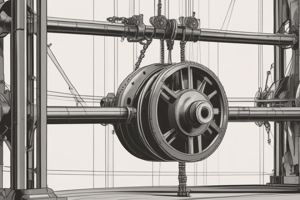Podcast
Questions and Answers
¿Cuál es el tipo de máquina simple que reduce la fricción y aumenta la eficiencia?
¿Cuál es el tipo de máquina simple que reduce la fricción y aumenta la eficiencia?
- Lever
- Rueda y Eje (correct)
- Pulley
- Inclined Plane
¿Qué máquina simple cambia la dirección o magnitud de la fuerza?
¿Qué máquina simple cambia la dirección o magnitud de la fuerza?
- Pulley
- Lever (correct)
- Screw
- Wedge
¿Cuál es el tipo de máquina simple que se utiliza para separar objetos o concentrar fuerza?
¿Cuál es el tipo de máquina simple que se utiliza para separar objetos o concentrar fuerza?
- Lever
- Wedge (correct)
- Inclined Plane
- Rueda y Eje
¿Qué máquina simple se utiliza para convertir el movimiento rotatorio en movimiento lineal?
¿Qué máquina simple se utiliza para convertir el movimiento rotatorio en movimiento lineal?
¿Cuál es el tipo de máquina simple que se utiliza para reducir el esfuerzo requerido para levantar o mover objetos?
¿Cuál es el tipo de máquina simple que se utiliza para reducir el esfuerzo requerido para levantar o mover objetos?
¿Qué máquina simple cambia la dirección de la fuerza o multiplica la fuerza?
¿Qué máquina simple cambia la dirección de la fuerza o multiplica la fuerza?
¿Cuál es el tipo de máquina simple que se utiliza en una variedad de aplicaciones en ingeniería, física y vida cotidiana?
¿Cuál es el tipo de máquina simple que se utiliza en una variedad de aplicaciones en ingeniería, física y vida cotidiana?
¿Cuántos tipos de máquinas simples hay?
¿Cuántos tipos de máquinas simples hay?
Flashcards are hidden until you start studying
Study Notes
Simple Machines
Simple machines are the basic components of more complex machines and mechanisms. There are six types of simple machines:
1. Inclined Plane
- A flat surface tilted at an angle
- Examples: ramps, stairs, ladders
- Advantage: reduces effort required to lift or move objects
2. Lever
- A rigid bar or beam that pivots around a fixed point (fulcrum)
- Examples: seesaws, crowbars, door handles
- Advantage: changes direction or magnitude of force
3. Wheel and Axle
- A circular object that rotates around a fixed axis
- Examples: bicycle wheels, gears, pulleys
- Advantage: reduces friction and increases efficiency
4. Pulley
- A wheel with a grooved rim and a rope or cable wrapped around it
- Examples: elevator systems, cranes, block and tackle
- Advantage: changes direction of force or multiplies force
5. Screw
- A cylindrical object with a spiral ridge (thread)
- Examples: screwdrivers, jar lids, spiral staircases
- Advantage: converts rotary motion into linear motion
6. Wedge
- A triangular or tapered object that separates or holds objects apart
- Examples: knives, axes, chisels, doorstops
- Advantage: concentrates force or separates objects
These simple machines are the building blocks of more complex machines and mechanisms, and are used in a wide range of applications in engineering, physics, and everyday life.
Studying That Suits You
Use AI to generate personalized quizzes and flashcards to suit your learning preferences.




